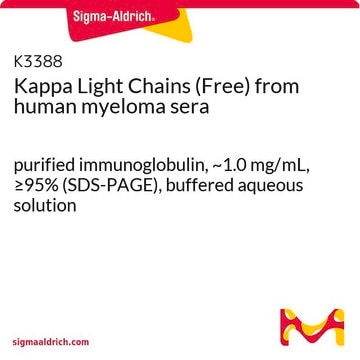K3502
Anti-Human Kappa Light Chain (Bound and Free) antibody produced in goat
affinity isolated antibody, lyophilized powder
Sign Into View Organizational & Contract Pricing
All Photos(1)
About This Item
Recommended Products
biological source
goat
Quality Level
conjugate
unconjugated
antibody form
affinity isolated antibody
antibody product type
secondary antibodies
clone
polyclonal
form
lyophilized powder
technique(s)
quantitative precipitin assay: suitable
storage temp.
2-8°C
target post-translational modification
unmodified
Gene Information
human ... IGK@(50802)
Looking for similar products? Visit Product Comparison Guide
General description
Anti-Human κ Light Chain (bound and free) antibody is obtained from goat antiserum. Immunospecific purification removes all goat serum proteins and immunoglobulins that do not bind to the κ light chain (bound and free). The antibody preparation is specific for κ light chains when tested against bound and free light chains. The product shows no reaction with bound or free λ light chains.
Immunogen
Purified human normal and myeloma κ light chain
Application
Anti-Human κ Light Chain (Bound and Free)-FITC antibody was used for as secondary antibody in ELISA at a working antibody dilution of 1:200 using maize seed extracts. For ELISA using NSO/1 myeloma cells, HEK293 cells and mouse plasma, antibody concentration of 1-2 μg/ml was used. The antibody was also used to coat the electrode surface in the preparation of antiatrazine immunosensor.
Anti-Human Kappa Light Chain (Bound and Free) antibody produced in goat has been used in western blotting.
Physical form
Lyophilized from 0.01 M sodium phosphate, 0.015 M sodium chloride, pH 7.2
Reconstitution
Reconstitute with 0.135 M sodium chloride.
Disclaimer
Unless otherwise stated in our catalog or other company documentation accompanying the product(s), our products are intended for research use only and are not to be used for any other purpose, which includes but is not limited to, unauthorized commercial uses, in vitro diagnostic uses, ex vivo or in vivo therapeutic uses or any type of consumption or application to humans or animals.
Not finding the right product?
Try our Product Selector Tool.
Certificates of Analysis (COA)
Search for Certificates of Analysis (COA) by entering the products Lot/Batch Number. Lot and Batch Numbers can be found on a product’s label following the words ‘Lot’ or ‘Batch’.
Already Own This Product?
Find documentation for the products that you have recently purchased in the Document Library.
Customers Also Viewed
Characterization of immunological interactions at an immunoelectrode by scanning electron microscopy
Ambrosi A et al
Electroanalysis, 19, 244-252 (2007)
Eva Gschmack et al.
Journal of neural transmission (Vienna, Austria : 1996), 129(5-6), 545-555 (2022-04-03)
Idiopathic Parkinson's disease (PD) is characterized by a progredient degeneration of the brain, starting at deep subcortical areas such as the dorsal motor nucleus of the glossopharyngeal and vagal nerves (DM) (stage 1), followed by the coeruleus-subcoeruleus complex; (stage 2)
Richard J Zahrl et al.
Microbiology (Reading, England), 164(4), 453-463 (2018-03-14)
The yeast Pichia pastoris (syn. Komagataella spp.) is a popular cell factory for recombinant protein production. Yeasts in general provide a good starting point for cell factory engineering. They are intrinsically robust and easy to manipulate and cultivate. However, their
Koreen Ramessar et al.
Proceedings of the National Academy of Sciences of the United States of America, 105(10), 3727-3732 (2008-03-05)
A series of small-molecule microbicides has been developed for vaginal delivery to prevent heterosexual HIV transmission, but results from human clinical trials have been disappointing. Protein-based microbicides, such as HIV-specific monoclonal antibodies, have been considered as an alternative approach. Despite
Kevin C Entzminger et al.
Protein engineering, design & selection : PEDS, 28(10), 365-377 (2015-08-19)
Antibody aggregation is frequently mediated by the complementarity determining regions within the variable domains and can significantly decrease purification yields, shorten shelf-life and increase the risk of anti-drug immune responses. Aggregation-resistant antibodies could offset these risks; accordingly, we have developed
Our team of scientists has experience in all areas of research including Life Science, Material Science, Chemical Synthesis, Chromatography, Analytical and many others.
Contact Technical Service












